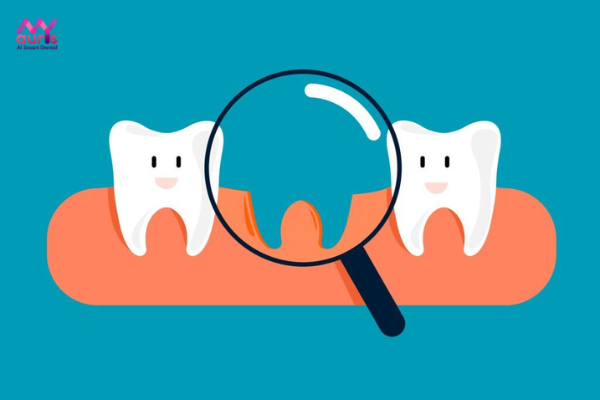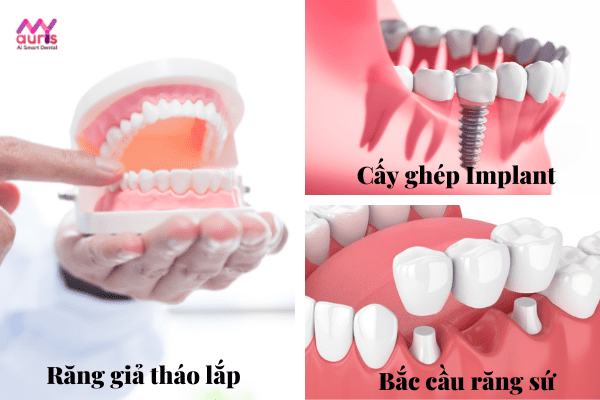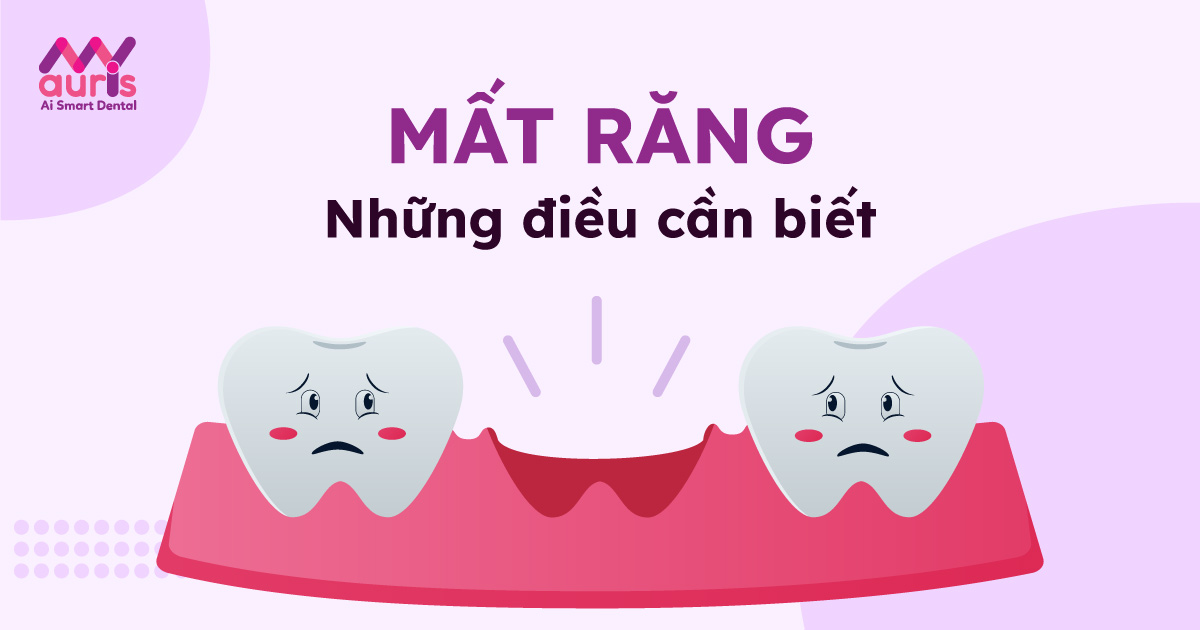Possessing strong, beautiful teeth will help us be more confident when communicating. At the same time, the eating process is also easier, pronunciation is also clearer and more accurate.
Each tooth has a different task and function: incisors (teeth number 1, 2, 3) are responsible for biting, canines bite and tear food, and the function of molars is to chew and crush food before swallowing. In addition, molars also help balance the face, incisors and canines play an aesthetic role in the teeth.
Whether in any position on the jaw, if you are missing just one tooth, you will encounter a lot of trouble, because it not only affects the jaw structure, the teeth are misaligned during chewing, oral health is affected due to diseases such as: tooth decay, gingivitis, inflammation. gums,… Because it takes on so many tasks and functions, what should you do if you unfortunately lose your teeth?
1. Function of teeth
A row of teeth consists of 32 teeth, including: incisors, canines and molars.
Incisors are teeth numbered (1, 2) located in the front of the jaw, in an easy-to-see position, with only 1 root, shaped like a shovel, with the function of biting food into bites. small pieces, helping to pronounce clearly and aesthetically for both teeth and face.
Canines are teeth number 3, located at the corner of the jaw with the function of biting and tearing food,
At the corner of the jaw, located right next to the incisors and molars. The canine helmet is thick, sharp and iron, and is responsible for gripping and tearing food.

Molar teeth are the teeth (4, 5, 6, 7) responsible for chewing and crushing food before digestion. Among them, teeth 4 and 5 are small molars, have a flat biting surface, and have a cube-shaped tooth cap, used for tearing and crushing. Teeth 6 and 7 are molars, the largest teeth on the jaw. The chewing surface is large, wide, has grooves on the surface and consists of 2 or 3 legs, firmly on the jaw.
A full set of teeth will support the chewing process easily, the face is more balanced and aesthetic.
In the case of teeth number 8 (wisdom teeth) are the last teeth to grow, when reaching adulthood, the bones The jaw has hardened, not enough room for wisdom teeth to grow, causing teeth to grow in the wrong position. Therefore, wisdom teeth have no specific function and are dangerous to oral health.
2. What is tooth loss?
Tooth loss is a phenomenon that occurs at many ages, due to many different reasons, the people who lose teeth the most are the elderly. Because when you get older, your teeth get oldteeth gradually weaken, chewing function is seriously reduced.
Losing teeth not only affects health but also affects facial aesthetics because then, the jawbone at the position of tooth loss will gradually disappear, making the outer cheek area wrinkled, susceptible to premature aging.
3. What is the cause of tooth loss?
Teeth are lost due to many different reasons, possibly due to congenital tooth loss, or due to external causes such as:
-
Teeth are not cared for, not protected properly, not brushing teeth regularly, not using floss Dentistry, mouthwash… give bacteria the opportunity to accumulate, leading to dental diseases such as: tooth decay, gingivitis, especially periodontitis… this is one of the causes of tooth loss at a high rate, even if it is just a very slight impact,…
-
Tooth loss due to accidents, injuries in daily life and activities such as playing sports… affects bone structure jaw.
-
Some cases of tooth loss are hereditary and are born with missing teeth in some positions on the jaw…
-
If you regularly eat soft foods, your teeth and gums have less opportunity to function strongly, your ability to chew hard foods is limited, and your teeth’s chewing force is weak. gradually.
-
The rate of tooth loss in men over 35 years old is higher than in women.
-
Smokers have a higher rate of tooth loss than non-smokers, because plaque accumulates on teeth, gingivitis appears and gradually causes tooth loss.
-
Hormonal changes in pregnant women will reduce the gums’ resistance to bacteria in the oral cavity or when the gums are damaged by tartar, the gums will gradually recede, tooth bone loss will occur, causing the connection between the gums and teeth to lose connection, the teeth become loose and unstable on the jaw.
-
As age increases, health weakens, elderly people will regularly use health support drugs… leading to dry mouth, reduced salivation, plaque on teeth is not removed, teeth become weaker, leading to loose teeth and tooth loss.
-
Patients with diabetes, high blood pressure, rheumatoid arthritis… are also at risk of losing teeth. higher teeth than people with stable health.

4. Consequences of tooth loss
Tooth loss directly affects health and spiritserious. Depending on the location of the missing tooth, it will affect the individual functions of each tooth such as: pronunciation, biting, tearing, crushing food, etc.
If teeth are lost, the patient only focuses on chewing on one side and has to chew more slowly. Not only is the chewing process difficult, but it also affects the teeth and facial muscles, because missing teeth will change the mouth and face.
Tooth loss reduces chewing force, food is not crushed before swallowing, and the mechanism of nutrient absorption in the intestines and stomach is also reduced. The risk of gastrointestinal diseases is increasing. Therefore, people with tooth loss have to eat soft, easy-to-eat foods, which affects eating preferences, causes anorexia, and affects the health and spirit of people with tooth loss.
Because there is no longer chewing force acting on the teeth, the stimulation to the jawbone around the teeth is no longer there, and the jawbone density is gradually reduced. If left for a long time, it will affect the replacement tooth implant. At this time, if you want to plant dentures, the doctor must perform additional bone graft surgery to be qualified to plant dental implants.
The function of the jaw bone is to support the facial structure. Bone loss from teeth will cause sunken cheeks, sagging facial skin, and wrinkles appear on the skin around the mouth, making people who have lost teeth look old before their time. Affects facial aesthetics.
A strong set of teeth, with a full set of 32 teeth, each tooth will be able to support the other, and the chewing force will be spread evenly. If teeth are lost and do not find a way to restore them soon, it will create a burden on the remaining teeth, causing the teeth to become misaligned, affecting the chewing process, affecting the temples and jaw, jaw fatigue, muscle fatigue,…
Molar teeth have the function of protecting the jawbone and completing the chewing system. If jaw bone number 6 or number 7 is lost, it will cause very serious consequences. Because at this time, the chewing force must focus on the remaining teeth, causing the teeth to shift due to excessive chewing force. Over time, missing teeth will affect facial aesthetics, causing the remaining teeth to loosen and have to be removed, leading to the risk of mass tooth loss.
If you lose your front teeth, it will affect your pronunciation, causing you to lisp and incorrectly pronounce some special consonants or vowels.
When teeth are lost, the remaining teeth will no longer have support and will gradually shift in random directions. The impact of chewing force is not consistent, causing the nerve connecting the two jawbones to be affected.
In case of tooth loss in the molar position, although it does not affect aesthetics, it greatly affects chewing function. As for front teeth, if unfortunately lost teeth will cause teeth to have a gap in the jaw, making you feel shy, lose confidence, affecting communication, work and life.
5. Harmful effects of long-term tooth loss
This is a dangerous condition that directly affects oral health. This issue does not receive much attention, at leastt is for middle-aged aunts and uncles. If molars are lost for a long time, it becomes even more serious. Although it does not affect aesthetics, it makes chewing difficult, the face ages earlier than the real age, the adjacent teeth gradually weaken, and there is a risk of contracting a number of dangerous oral diseases: tooth decay, periodontitis, jaw fatigue, bite… more severe than mass tooth loss.
The causes of the above consequences are due to:
-
The jawbone in the toothless space after a long period of time without impact will gradually disappear, then the gums will recede.
-
If the tooth is lost for too long, the tooth has lost its bone, the surrounding teeth will lose their support, the teeth will shift, and gradually tilt towards the lost tooth, the opposite tooth. will hang down. The jawbone is destroyed, causing the cheek area where the tooth is lost to be sunken, wrinkled, sagging, and losing balance.
-
Molar teeth are responsible for crushing food and taking on the chewing function. If molars are lost, food cannot be crushed, the digestive organs have to work harder to absorb and metabolize food. Over time, it will lead to inflammation and pain in the stomach and colon.
-
If the cause of tooth loss is due to disease, do not try to replant the tooth early, do not treat dental diseases, it will cause gingivitis, pulpitis… You will feel increasingly uncomfortable, your gums will swell and bleed easily during oral hygiene or chewing.

6. Loss of teeth in the entire jaw
Is a common condition in the elderly, occurring in the upper jaw, lower jaw or both jaws. The cause may be due to dental diseases such as tooth decay, periodontitis or accidental injury… .
Loss of teeth in the entire jaw affects the aesthetics and function of teeth, changes the face, difficulty communicating, loss of confidence, poor chewing, leading to diseases related to the digestive system such as: stomach pain, colitis,… malnutrition due to inability to absorb food…
After tooth loss, depending on Depending on the tooth condition and jaw bone properties, bone loss time is different.
7. How to treat tooth loss
If you lose teeth, the best solution is to replant new teeth to limit the risks and potential dangers that may be encountered.
Currently, there are many popular denture implant techniques such as: Removable dentures, porcelain bridges and dental implants.
-
Tooth implantation with removable dentures:
An old method of denture implantation, suitable for older people who have lost all their teeth, people who have lost teeth but have a weak jaw bone structure and are not strong enough for implants or porcelain dental bridges.
Dental implantation using jaws Removable dentures will quickly restore teeth without affecting the real teeth. This type of denture has the advantages of: low cost, easy cleaning, high durability, easy to use.
Depending on the conditions and condition of teeth, you can choose partial or full removable dentures.
-
Ceramic dental bridge for missing teeth
Is a method of implanting dentures to replace lost teeth with a porcelain dental bridge. A dental bridge is a series of at least 3 or more porcelain teeth, crafted together, fixed to the real tooth post with dental glue. The two real teeth adjacent to the missing tooth will be partially ground down to make a bridge abutment, helping the bridge stay firmly on the jaw.
Compared to dentures with removable jaws, restoring dentures with a porcelain bridge will have more advantages in terms of aesthetics and chewing ability.
The treatment time is also shorter, the bridge material is safe for the body. can.
Removable dentures and porcelain bridges can only restore the tooth crown. Porcelain bridges must grind the two adjacent teeth as abutments, because when one tooth is lost, a bridge consisting of 3 adjacent porcelain teeth is needed. Therefore, it will affect the health of the 2 teeth next to the lost tooth.
Both methods cannot prevent it. Bone loss. That’s why the dental implant method was born.
-
Dental implant
With the continuous advancement of modern dentistry, dental implants are recommended. prescribed for cases of losing one tooth, many teeth or losing a whole tooth.
This is a new tooth implantation technique, using artificial tooth roots to implant directly into the lost tooth position, to restore the aesthetics and function of the tooth with the same color and shape as real teeth.
This tooth implantation method is performed in the operating room with equipment. and medical instruments are absolutely sterile. This is a dental implant method that is considered perfect because of the following advantages: Overcoming jaw bone loss, no need to grind teeth, non-invasive…
In case of missing full teeth, the doctor will prescribe the All-on-4 or All-on-6 dental implant method to replace lost teeth by implanting 4 or 6 implants in each tooth. jaw, then install a dental bridge on top. Implants fully restore the chewing ability as well as the aesthetics of your teeth. Dentures restored with implants will give new teeth like real teeth at the most reasonable cost.

8 Implant
Healthy gums are an important criterion for dental implant surgery. You cannot have this procedure if you have gingivitis.
Because gingivitis is an infectious disease, it can cause damage to the gums and jawbone. If left untreated, it can cause infection around the implant site and lead to tooth decay Implant posts are rejected. Therefore, it is necessary to treat gingivitis before implanting dental implants.
Smoking is also a cause of implant rejection, because it restricts blood flow to the gums, slowing down the process of implant integration with the jaw bone 1 week before surgery and 2 months after dental implants.
Jaw bone quality is also an important factor that determines whether an implant is successful or not. If the bones are not healthy, or lack bone, the doctor will implant more bone to increase your bone density before implanting.
Be careful when using medication. before, during and after tooth implantation. You should consult your doctor before use.
If the surgery is to be successful, oral hygiene is very important. Otherwise, it will be easy to get infected at the implant site and be rejected.
Choose a reputable, quality dentist to have your tooth implanted by a highly experienced and qualified dentist. New, modern material equipment, Implant posts with clear origin. Ensure effectiveness and safety during and after dental implantation.
9. Where is the most reputable dental implant address?
With the continuous development of modern dentistry, dental implants have become the best method of restoring lost teeth for patients with tooth loss, because of the outstanding advantages it brings such as: restoring lost teeth, improving chewing function, and aesthetically correcting missing teeth. However, among many dentists with different information, what is a good address for dental implants? most?
You can rely on the following 4 criteria to choose a standard dental implant dentist:
-
There are doctors with specialized training in dental implants
-
Modern, genuine dental implant
-
Precise implant technique
-
Modern facilities and equipment





